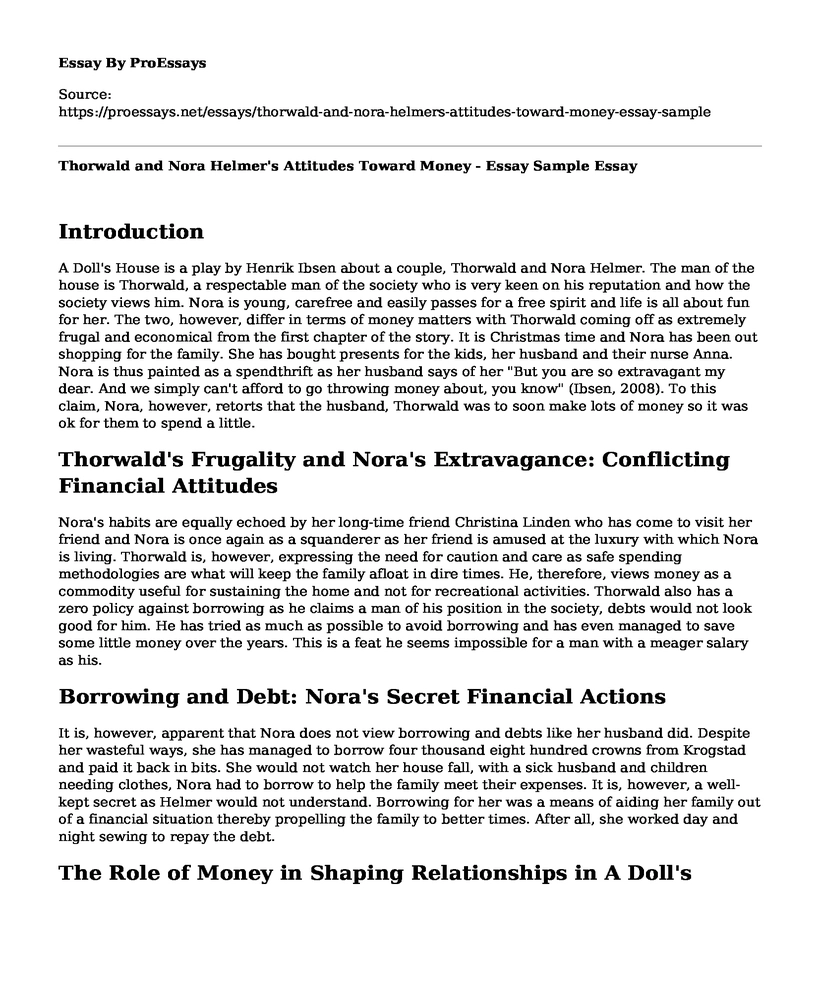Introduction
A Doll's House is a play by Henrik Ibsen about a couple, Thorwald and Nora Helmer. The man of the house is Thorwald, a respectable man of the society who is very keen on his reputation and how the society views him. Nora is young, carefree and easily passes for a free spirit and life is all about fun for her. The two, however, differ in terms of money matters with Thorwald coming off as extremely frugal and economical from the first chapter of the story. It is Christmas time and Nora has been out shopping for the family. She has bought presents for the kids, her husband and their nurse Anna. Nora is thus painted as a spendthrift as her husband says of her "But you are so extravagant my dear. And we simply can't afford to go throwing money about, you know" (Ibsen, 2008). To this claim, Nora, however, retorts that the husband, Thorwald was to soon make lots of money so it was ok for them to spend a little.
Thorwald's Frugality and Nora's Extravagance: Conflicting Financial Attitudes
Nora's habits are equally echoed by her long-time friend Christina Linden who has come to visit her friend and Nora is once again as a squanderer as her friend is amused at the luxury with which Nora is living. Thorwald is, however, expressing the need for caution and care as safe spending methodologies are what will keep the family afloat in dire times. He, therefore, views money as a commodity useful for sustaining the home and not for recreational activities. Thorwald also has a zero policy against borrowing as he claims a man of his position in the society, debts would not look good for him. He has tried as much as possible to avoid borrowing and has even managed to save some little money over the years. This is a feat he seems impossible for a man with a meager salary as his.
Borrowing and Debt: Nora's Secret Financial Actions
It is, however, apparent that Nora does not view borrowing and debts like her husband did. Despite her wasteful ways, she has managed to borrow four thousand eight hundred crowns from Krogstad and paid it back in bits. She would not watch her house fall, with a sick husband and children needing clothes, Nora had to borrow to help the family meet their expenses. It is, however, a well- kept secret as Helmer would not understand. Borrowing for her was a means of aiding her family out of a financial situation thereby propelling the family to better times. After all, she worked day and night sewing to repay the debt.
The Role of Money in Shaping Relationships in A Doll's House
Thorwald on finding out does not deal kindly with the news, accusing the wife of undermining his efforts. Hs stingy attitude is highlighted in this case and instead of being grateful, he admonishes the wife who had in an actual sense saved his life. Thorwald's stingy nature with cash is so obvious till his friends are aware of it. He does not allow the wife to indulge herself by purchasing sweet eatables like macaroons. Nora presents some to Doctor Rank who exclaims that he thought they were a banned contraband in the house by Thorwald (Ibsen, 2008).
Conclusion
In conclusion, while Thorwald views the wife's use of money as prodigal, Nora views her husband as thrifty. The two are clearly different with distinct attitude towards the use of and how to save or borrow money.
Reference
Ibsen, H. (2008). A doll's house. A&C Black.
Cite this page
Thorwald and Nora Helmer's Attitudes Toward Money - Essay Sample. (2022, May 16). Retrieved from https://proessays.net/essays/thorwald-and-nora-helmers-attitudes-toward-money-essay-sample
If you are the original author of this essay and no longer wish to have it published on the ProEssays website, please click below to request its removal:
- How Northup and Rowlandson Experienced Captivity
- Wes Moore Synthesis Paper
- Compare and Contrast Macbeth and Lady Macbeth Essay
- Poetry Analysis Essay on The Tell-Tale Heart: A Deceptive Narrator's Guise of Innocence
- Symbolic Representations of Success & Failure in Death of a Salesman - Essay Sample
- Be Clear & Specific: Writing for Impact & Beauty - Essay Sample
- Recover From Losses - Essay Sample







